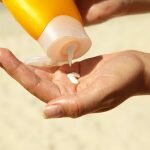Beware Of Lathering Yourself With ‘Poison’ This Summer
Here in the UK, summer is still far away and since the weather can be notoriously fickle there’s a possibility that we won’t have much of a summer anyway. This, however, won’t stop many of us packing our beach bags to head somewhere warmer and far more sunny…
Bring on the sunscreen… and skin cancer?
If there’s one thing we all know by now, then it is that when you hit the beach you need to make sure you are lathered in sun cream… because that’s what every sunscreen ad tells us to do… be careful, be aware and be diligent… and protect yourself from skin cancer at all costs.
The only thing is, when you cover up with sunscreen you are rubbing a long list of potentially dangerous (and in some cases even possibly cancer-causing) agents all over your body. I’m talking about harmful chemicals including oxybenzone, triclosan, parabens and phthalates to mention but a few.
And if you think, “Oh but it’s only on my skin so it won’t damage my health”, think again. A recent study, conducted at the Faculty of Pharmacy at the University of Manitoba, Canada, showed that these sunscreen agents ALL significantly penetrate the skin, meaning all of these chemicals are entering multiple tissues within the body.
Lather yourself in sunscreen every day for about 10 days and chances are that your skin has absorbed a terrifying amount of harmful toxins.
Fortunately, you don’t have to put yourself in harm’s way this summer. Another study, published in the journal Environmental Health Perspectives showed that participants had a significant drop in hormone-disrupting chemicals in their bodies after they switched to ‘cleaner’ sunscreen and personal care products.
The truth is, when it comes to sun protection there is only one safe way: stop, drop, and roll:
Stop: Remove all sunscreen with harsh chemicals from your bathroom cupboard.
Drop: Remove the excess layers of clothing long enough to expose your skin to the sun for a short time (no longer than 15 minutes).
Roll: Once you’ve given your skin the sun exposure it needs, roll your sleeves down, put on your hat, and protect your skin from extended exposure.
A few minutes of unprotected sunlight exposure is good, of course. It prompts your skin to produce vitamin D. And direct sunlight is the best way to boost your vitamin D levels. But don’t worry. Your skin actually knows how to protect itself through this brief exposure, even if you are fair skinned.
Then it’s time to cover up because no matter what your complexion you should always try to avoid extended exposure. And if you’re going to be out in the sun for a while this summer, wear a hat, long trousers or a long skirt, and other clothing that covers as much skin as possible.
If you spend a beautiful summer day outdoors with your children or grandchildren, it’s hard to keep them fully clothed. So the sunscreen you choose needs to be the least harmful.
Every year, the Environmental Working Group (an independent non-profit organisation in the US) revises its sunscreen safety ratings. With these ratings, you’ll find the most effective sunscreens with the least amount of unnecessary and potentially harmful chemicals.
Did you find this information useful?
Then why not get more expert health recommendations just like this delivered direct to your inbox?
"It is truly refreshing to read a newsletter on the topic of alternative medicine which is scientifically based and reviewed by professionals..." - Robert Sinott
We respect your privacy and will never share your details with anyone else.Disclaimer: Bear in mind the material contained in this article is provided for information purposes only. We are not addressing anyone’s personal situation. Please consult with your own physician before acting on any recommendations contained herein.
Sources:
“Sun Exposure Benefits May Outweigh Risks Say Scientists” Catharine Paddock, Medical News Today, 5/8/13, medicalnewstoday.com
Excuse Me While I Lather My Child in This Toxic Death Cream, published online 06.03.2016, huffingtonpost.com
How sunscreen could be causing skin cancer, not the sun, published online 13.02.17, collective-evolution.com
- Comments (0)
- Facebook Comments (0)












